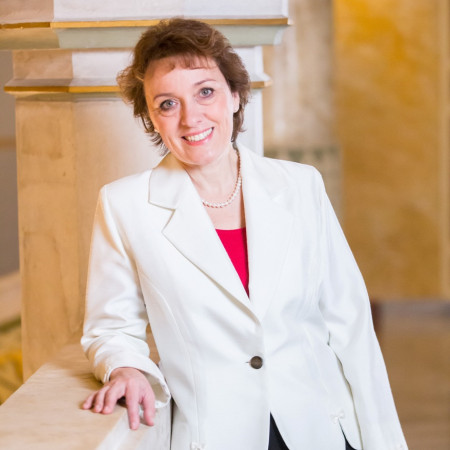
Born: 1961, Budapest
Academic degree, university position: habilitated associate professor
Studies:
1980–1983: Liszt Ferenc Academy of Music – Teacher Training Institute, Piano Major, under Professors Erzsébet Tusa and Edit Hambalkó
1984–1989: Liszt Ferenc Academy of Music, Musicology Major, under Professors György Kroó, József Ujfalussy, László Somfai, László Dobszay, Katalin Komlós, János Kárpáti, Tibor Tallián, Sándor Kovács, András Batta, András Szőllősy
1996–1997: Eötvös Loránd University, Faculty of Arts, Cultural Manager Major
Study and research trips abroad:
1982: Paris (Saint-Germain-en-Laye), piano master class with Yvonne Lefébure
1992: Paris, research of composer László Lajtha's works
1998: Oxford and London, research on church music, with Professor László Dobszay as consultant
2005: Dublin, English language course
2007: London, research of composer László Lajtha's works
2009: Paris, research of composer László Lajtha's works
2011: Paris, research of composer László Lajtha's works
Teaching experiences:
1994 to 1995: Alternative Secondary School of Economics
1995 to 1996: Ferenc Erkel Secondary School
Since 1995: St. Stephen King Secondary School of Music
Since 2001: Liszt Ferenc Academy of Music (senior lecturer since 2004)
Major field of research:
composer László Lajtha's works
Publications in English:
2007 „»Bartók always called me Latin«: The Influence of Béla Bartók on László Lajtha's Life and Art." Studia Musicologica 48/1–2, 2007, 215–223.
1992 „Music Management Agencies in Hungary '92." Hungarian Music Quarterly Vol. III, No. 2, 2–6.
1992 „The French Institute of Budapest." Hungarian Music Quarterly Vol. III, Nos. 3–4, 42–43.
1994 „The Budapest City Council and Music." Hungarian Music Quarterly Vol. V, No. 2, 2-7.
1995 „»I have defence for tradition.« A Conversation with István Lantos." Hungarian Music Quarterly Vol. VI. Nos. 1–2, 44–47.
1997 „The Bartók Memorial House. A Conversation with Director Zsuzsa Nyujtó." Hungarian Music Quarterly Vol. VIII. Nos. 1–2, 24–27.
1999 „»What is the key signature in F sharp minor?«Teaching English music vocabulary at the advanced teacher training course held at the Zoltán Kodály Secondary School of Music and the Pedagogical Institute of Budapest A talk with Eszter Dobozi Alföldyné and Kata Kövendi Itzésné." Parlando 1999, vol. 6. pp 49–57.
2000 „In the Field of Culture Hungary is a Great Power. An Interview with György Odze and Katalin Bogyay in London." Hungarian Music Quarterly Vol. XI.Nos. 1–2, 30–34.
2000 „»To experience totality«. A conversation with pianist-conductor Tamás Vásáry." Hungarian Music Quarterly Vol. XI.Nos. 1–2, 43–48.
2000 „A festival of the piano in the East. Summer evening music in the French garden of the Andrássy Castle in Tiszadob." Hungarian Music Quarterly Vol. XI, Nos. 3–4, 44–47.
2000 „»I want harmony in and around me«. A conversation with Andrea Rost." Hungarian Music Quarterly Vol. XI, Nos. 3–4, 50–55.
Presentations:
Presentation in English about László Lajtha at an international conference:
International Bartók Conference ("Bartók's Orbit. The Context and Sphere of Influence of His Work") Budapest, Hungarian Academy of Sciences, Institute for Musicology, Bartók Archive. Bartók always called me Latin. The Influence of Béla Bartók on László Lajtha's Life and Art. 23 March 2006 (Published: Studia Musicologica, an International Journal of Musicology, Volume 48, 2007, 48/1–2, 215–223.)
Presentations in English at international conferences about the work of the Psalmus Humanus Association for Arts Education:
25th World Conference of ISME (International Society for Music Education), Bergen (Norway). Psalmus Humanus. Tradition and Innovation in Hungarian Music Education. 13 August 2002
17th International Kodály Symposium, Leicester (United Kingdom) (organizer: British Kodály Academy, sponsored by the International Kodály Society). Back to Kodály! Psalmus Humanus Arts Educational Programme – a New Means in Implementing Kodály's Vision. 18 August 2005
UNESCO Preparatory Regional Conference for Arts Education for Europe and North America (("Synergies between Arts and Education") Vilnius (Lithuania). Integrated Arts Education – a Pillar of Socioeconomic Development; the Psalmus Project as a Means of Implementing Kodály's Concepts in the 21st Century. 9 September 2005
UNESCO World Conference on Arts Education ("Building Creative Capacities for the 21st Century") Lisbon (Portugal). Psalmus Humanus Forum of the Visegrád Countries in Budapest. Czech – Hungarian – Polish – Slovak Arts Educational Project for Social Equality. 8 March 2006
25th World Conference of ISME (International Society for Music Education) Kuala Lumpur (Malaysia). Cooperation between music and arts teachers of the Visegrád Countries. New approaches and methods based on Kodály's concepts. 20 July 2006
Internet:
Music composers' database – English-language database of László Lajtha's works with opus numbers (since 2002)
website structure, editing, studies, list of works, discography, etc. (since 2008)
Miscellaneous activities:
Since 1982: lectures on music at events organized by the Hungarian Scientific Educational Association
1983-84: contact person responsible for communication in French at the Interkoncert Office of Music Competitions and Festivals.
Since 1987: in the media: Hundreds of interviews (Claudio Abbado, Yehudi Menuhin, György Sebők, András Schiff, Zoltán Kocsis, Miklós Perényi, Tamás Vásáry, etc.), reviews and articles in newspapers and magazines like Esti Hírlap, Népszabadság, Vasárnapi Hírek, Muzsika, Operaélet, Hangszer és Zene, Parlando, Metronóm, Iskolakultúra, Gramofon, Hungarian Music Quarterly, etc. in Hungarian and in English, and programmes at radio stations ( like Új Zenei Újság)
Since 1989: programmes in the Hungarian Radio
1988–89: classical music editor at Ritmus magazine
Since 1998: advanced teacher trainings in Budapest and other Hungarian cities
Since 1999: book and sheet music publishing ceremonies
Since 2000: lectures at the School for Musical Instrument Makers of the Liszt Academy of Music
2001 to 2010: President of the Mozart Klub of the Óbuda Society
2006: host of the Carpathian Basin Bartók contest
2007: host of the Carpathian Basin Kodály contest
Memberships:
Hungarian UNESCO committee – Education Subcommittee member
ISME (International Society for Music Education), member
Hungarian Music Council, board member
Hungarian Musicological Society, founding member
László Lajtha Foundation, member of the Curate, Artistic Director
Hungarian Music Teachers´Association, board member
Jeunesses Musicales Hungary, board member, previously President
National Association of Hungarian Creative Artists
Hungarian Association of Hungarian Journalists
Awards:
2002: László Lajtha Award
2005: Zugló for Public Education Award
2012: Bence Szabolcsi Award
2022: Szent László Award
2023: Széchenyi Award
2022: Szent László Award
2023: Széchenyi Award
Contact:
E-mail: solymosi.tari.emoke[at]gmail.com


